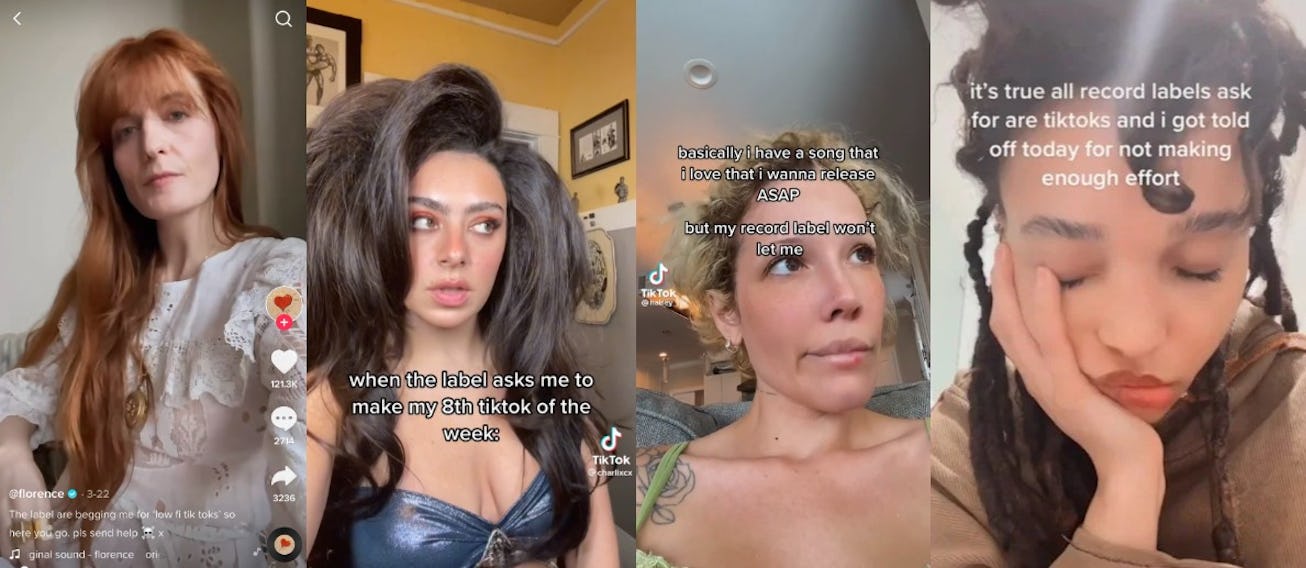
Culture
What’s Going On With Record Labels and “Viral” TikTok Moments?
Going viral on TikTok is an effective marketing tool — but what happens when it gets in the way of the art itself?
Growing up is a series of moments that unveil that so many pillars of society are, in fact, a scam. I remember the first time the curtain on the music industry was lifted for me, after I watched Josie and the Pussycats, the seminal 2002 satire with a bangin’ soundtrack starring Rachael Leigh Cook, Tara Reid, and Rosario Dawson. In the film’s cold open, the record label purposefully crashes the plane of America’s hottest band after they start to question how they got so famous so quickly. Later, Josie and the Pussycats, uncover the music industry’s long con: It’s selling products and musicians themselves through subliminal messaging in the music. Josie and the Pussycats aren’t famous because people like their songs; they’re simply part of a machine.
Many smart people and musicians have written an encyclopedia’s worth on why the music industry is difficult for artists. Whether it’s streaming platforms’ monopoly or the toll touring takes on your physical and mental health, there’s more than enough literature to convince any hopeful to put down their guitar and go get a job in advertising. Now, a debate is happening over the industry’s desperate and embarrassing attempts to fabricate viral moments on TikTok.
The latest contributor to this debate is Halsey, who posted a video that has, in fact, gone viral on TikTok about their labels’ demands when it comes to the app.
“Basically, I have a song that I love that I want to release ASAP, but my record label won’t let me,” Halsey wrote in the video, which was captioned “I’m tired.” “I’ve been in this industry for eight years and I’ve sold over 165 million records and my record company is saying I can’t release [the song] unless they can fake a viral moment on TikTok.”
Since Halsey posted the video on May 22, it’s racked up 1.1 million likes and more than ten thousand comments. But even after Halsey created a viral video the label wanted, Capitol Records still doesn’t appear to be budging. The singer later wrote on Twitter: “Talked to my label tonight after my tiktok tantrum. They said ‘wow the tiktok is going really strong!’ I was like ok cool so can I release my song now? They said ‘we’ll see!’ tell me again how I’m making this up.”
On May 23, Halsey answered fans’ questions about the song, and about details on why they can’t release it on Twitter, explaining that Halsey can’t release the song because the record company owns the masters, that they can’t release it on another label because there’s a contract, but that the singer is considering playing the song live while awaiting its release.
Halsey is the latest of a string of musicians to express frustrations over their labels demanding viral content, joining artists like Charli XCX, FKA Twigs, Florence + The Machine, who have all talked candidly on TikTok about their disdain for their labels’ demands. Adele’s label infamously asked her to create songs that were more TikTok-friendly. “They're like, 'We've really got to make sure that these 14-year-olds know who you are,'" Adele said in an interview with Apple Music. "I'm like, but they've all got moms. They've all got moms, and they've definitely been growing up listening to my music, these 14-year-olds." She added that if everyone was focusing on making music for TikTok, "who's making the music for my generation?"
The definition of viral does not require spontaneity, but young consumers are skeptical and can generally spot when something is designed to go viral, or are weary when a company feels like its marketing or branding is pandering. Which brings us to what you might be thinking while you watch Halsey’s video: Is the singer’s self-described “TikTok tantrum” not the marketing itself?
One of the top comments on their video is: “This is the viral marketing video…,” to which Halsey responds, “Bruh I wish it was haha. They just said I have to post tiktoks they didn’t specifically say ‘about what’ so here I am.”
A professor once told me it’s not an artists’ job to talk about their work; their job is to create the art. Artists already have to do so much self-promotion that’s not about making the art — and Halsey already acknowledged its not the act of making the TikToks that bothers them: It’s the labels’ requirement that something be “viral.”
It’s reasonable that artists don’t want the self-promotion to eclipse why they’re there in the first place, and it’s embarrassing for labels to be so transparent about their obvious attempts to be on-trend. But the insidious nature of virality and the press machine commodifies artists’ very act of expression around these constraints. Whether it’s intentional or not, like Halsey says in their video: “Everything is marketing these days.”
This article was originally published on